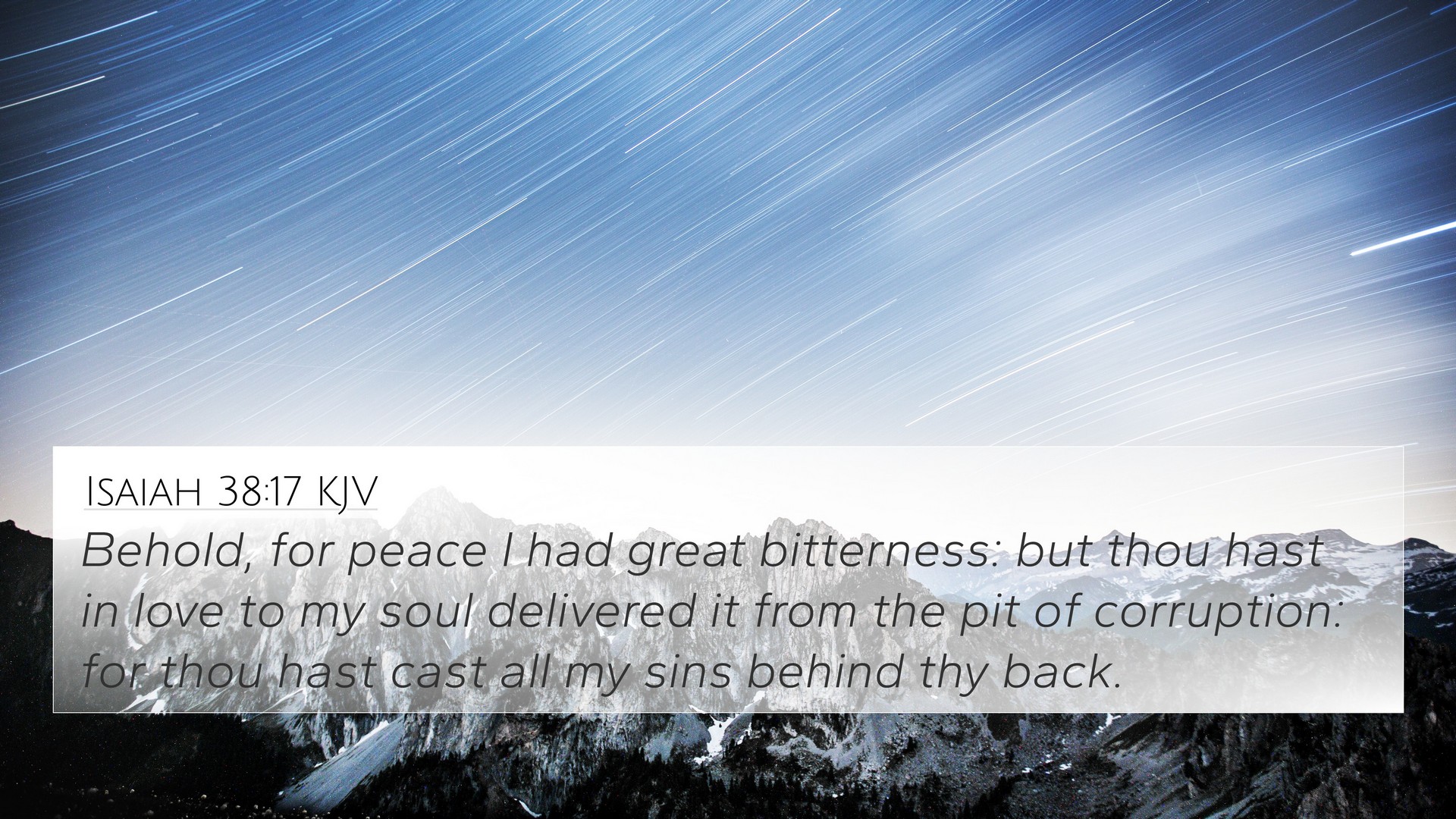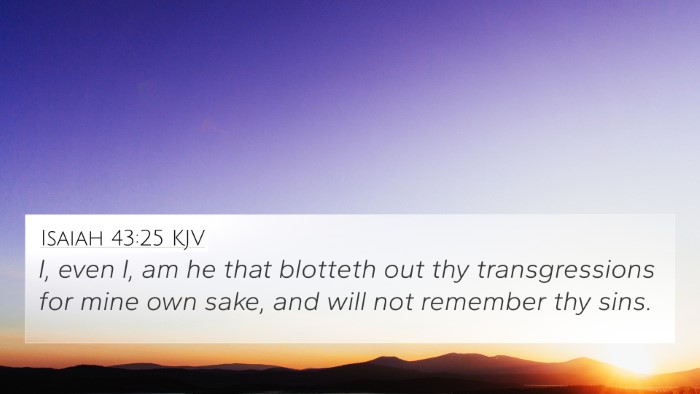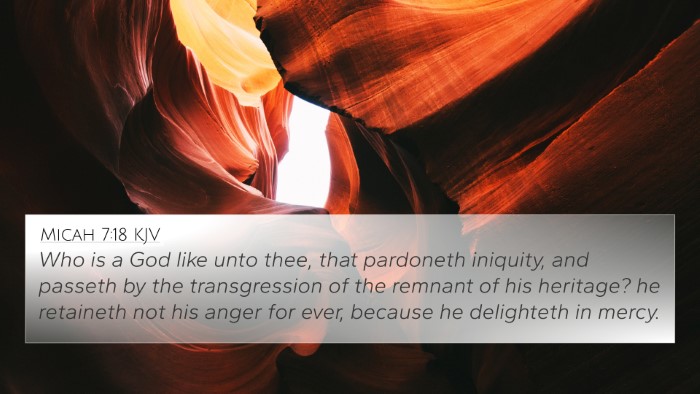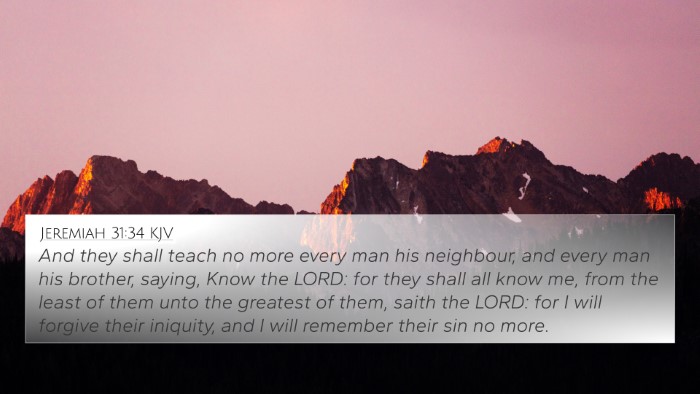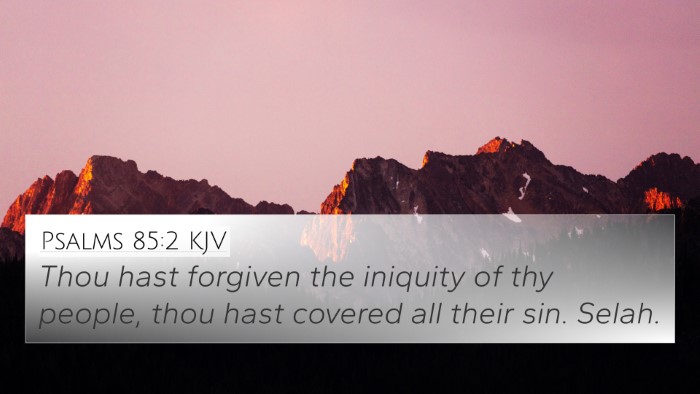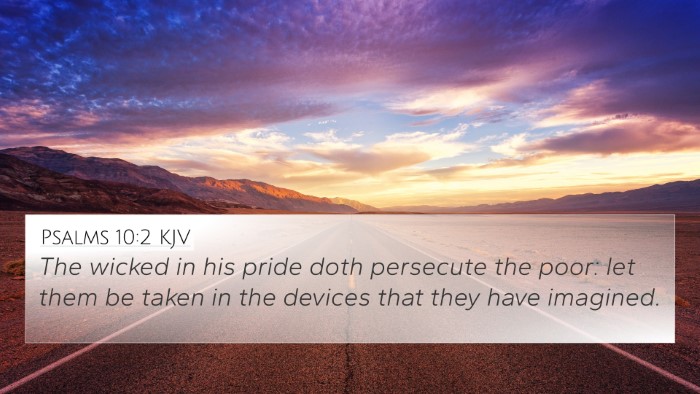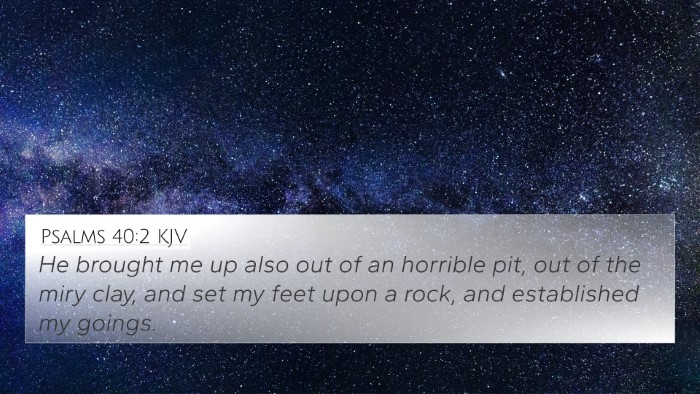Understanding Isaiah 38:17
Isaiah 38:17 reads: "Behold, for peace I had great bitterness; but thou hast in love to my soul delivered it from the pit of corruption: for thou hast cast all my sins behind thy back."
Summary of Insights
This verse, a profound declaration from King Hezekiah, encapsulates the themes of God’s mercy, forgiveness, and deliverance amidst suffering. It reflects a transition from despair to hope, emphasizing how divine love interacts with human anguish.
Key Themes and Meanings
- Bitterness and Peace: Hezekiah expresses the struggle between great bitterness and divine peace. The original Hebrew underscores a deep emotional turmoil contrasted with the peace found in God’s mercy.
- Divine Love: The phrase "thou hast in love to my soul" highlights God's personal, intimate care and compassion for His people, illustrating the depth of His love that leads to redemption.
- Deliverance from Death: The reference to “the pit of corruption” signifies a rescue not just from physical death, but spiritual decay, symbolizing salvation and restoration.
- Forgiveness of Sins: The casting of sins behind God's back represents total forgiveness, suggesting that God chooses to forget human failings when we come to Him with repentant hearts.
Bible Verse Cross-References
Several other scripture passages resonate with the themes present in Isaiah 38:17:
- Psalms 103:12: "As far as the east is from the west, so far hath he removed our transgressions from us." This scripture reinforces the concept of divine forgiveness and the removal of iniquities.
- Micah 7:19: "He will turn again, he will have compassion upon us; he will subdue our iniquities; and thou wilt cast all their sins into the depths of the sea." It mirrors the imagery of God removing sins, portraying His grace and mercy.
- Romans 8:1: "There is therefore now no condemnation to them which are in Christ Jesus." This reflects the New Testament understanding of deliverance from sin and its consequences.
- 2 Corinthians 5:17: "Therefore if any man be in Christ, he is a new creature: old things are passed away; behold, all things are become new." This supports the theme of renewal and transformation through God's love.
- Isaiah 43:25: "I, even I, am he that blotteth out thy transgressions for mine own sake, and will not remember thy sins." This verse parallels the act of God choosing to forget our sins, emphasizing His grace.
- Hebrews 8:12: "For I will be merciful to their unrighteousness, and their sins and their iniquities will I remember no more." This further illustrates the theme of forgiveness within the realm of divine mercy.
- Ephesians 1:7: "In whom we have redemption through his blood, the forgiveness of sins, according to the riches of his grace." This underscores the New Testament validity of the sentiments expressed in Isaiah 38:17.
Connections Between Bible Verses
Examining Isaiah 38:17 through the lens of other scripture offers a broader understanding of its implications:
- Old and New Testament Links: The themes of forgiveness and deliverance resonate throughout the Bible, showing a consistent narrative of God's character.
- Theological Reflection: Both Testaments confirm God's love and mercy, revealing continuity in God’s promise of salvation from sin.
- Emotional Dimensions: Connecting the human experience of bitterness with divine deliverance illustrates the relational aspect of God with His people.
Thematic Bible Verse Connections
When engaging in scripture study, the connections found in Isaiah 38:17 inspire deeper reflections:
- Hope Amidst Suffering: The transition from bitterness to peace serves as a reminder of God's prevailing hope even in dire circumstances.
- Faith and Trust: Hezekiah's declaration encourages believers to trust in God's mercy, reinforcing the idea of faith in the face of adversity.
- Life and Death Themes: The notions of life, death, and resurrection are woven throughout the Bible, leading to a comprehensive understanding of God's plan for humanity.
Tools for Bible Cross-Referencing
To delve deeper into the connections within the Bible, consider utilizing various tools:
- Bible Concordance: A Bible concordance is a valuable resource for identifying specific verses and their themes.
- Bible Cross-Reference Guide: This guide assists in discovering related verses that can enhance understanding.
- Bible Chain References: This method helps trace themes and teachings throughout scripture.
Conclusion
Isaiah 38:17 is a poignant reminder of God's love and mercy, revealing deep theological truths about forgiveness and deliverance that resonate throughout scripture. Engaging in cross-referencing and comparative analysis allows for richer insights and a profound appreciation for the interconnectedness of God's word. By exploring these connections, believers can deepen their understanding of spiritual truths and strengthen their faith journey.
